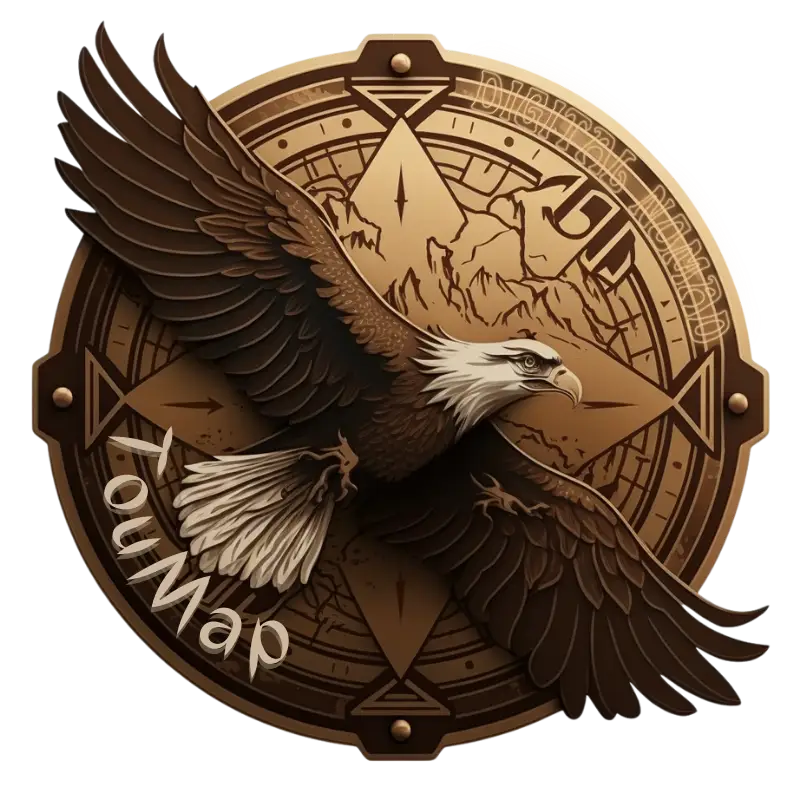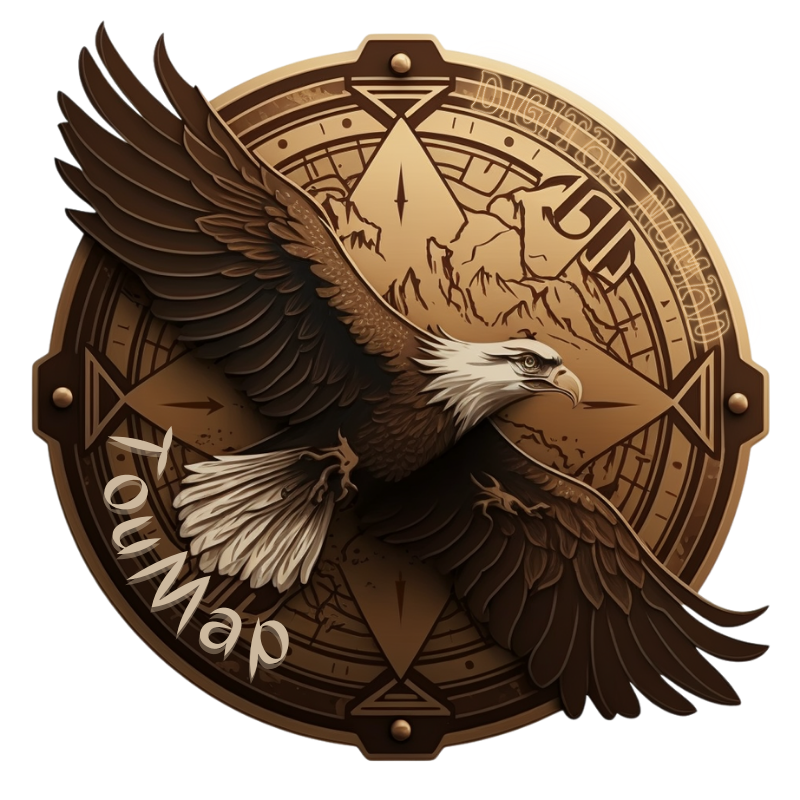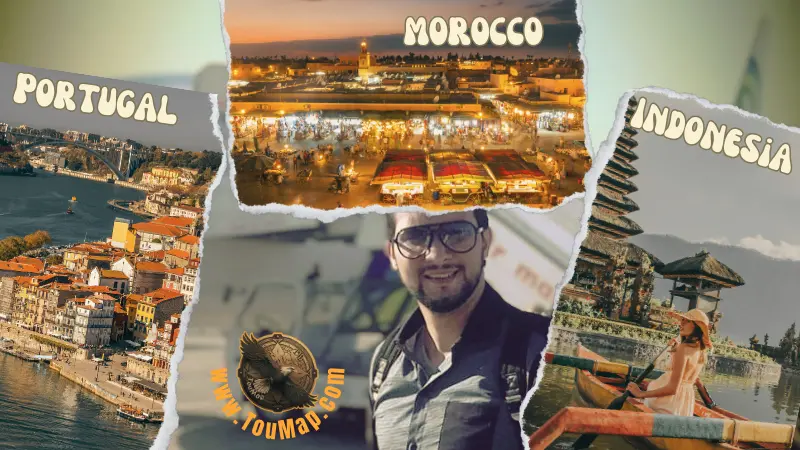3 Budget-Friendly: In the age of remote work, our world has transformed into a vast playground for the wanderlust-driven, digital-savvy professionals. Imagine working to the soothing sounds of a Balinese waterfall, or the faint murmur of a bustling souk in Marrakech, or maybe the serene view of a Portuguese coastline.
The dream? It’s more attainable than you think. With the right destination, a stable internet connection, and an appetite for adventure, the world is truly your office. Dive into this guide to discover three destinations that not only beckon with their beauty and culture but are also surprisingly gentle on your wallet. Embrace the digital nomad lifestyle and let’s explore these hidden gems together!
I. Morocco
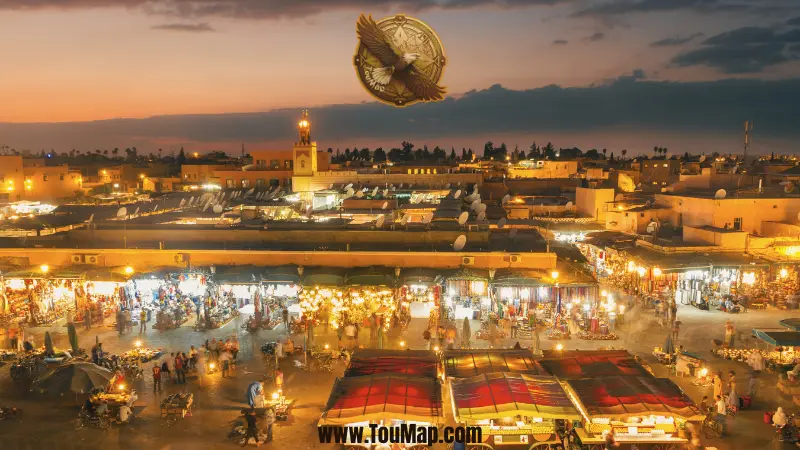
1. Overview:
Morocco, nestled at the crossroads of Africa and Europe, unfolds like a tapestry rich in history, culture, and geography. The unique blend of Arab, Berber, and European influences infuses every corner of the country, from the ancient labyrinthine medinas to the vast, majestic stretches of the Sahara. It’s truly a land where age-old traditions intermingle seamlessly with modernity, creating an ambiance of contrasts that’s alluring to many.
2. Digital Nomad Communities:
Over the years, Morocco has not only been a favorite among travelers and adventurers but also digital nomads seeking a blend of work and leisure. Cities like Marrakech, with its bustling Jemma el-Fna square and mosaic-tiled palaces, offer a sensory urban experience that’s both vibrant and inspiring.
On the other hand, Taghazout, once a sleepy fishing village turned surf town, has emerged as a hotspot for those desiring a serene work environment. Its beaches, lined with cafes offering strong Wi-Fi alongside even stronger coffee, are becoming increasingly popular with the remote working community.
Additionally, coworking spaces are sprouting up to cater to the growing demand, ensuring that digital nomads have all they need to work effectively.
3. Connectivity and Workspaces:
While Morocco’s ancient soul is evident in its architecture and traditions, the country is very much in tune with the modern digital age. Internet connectivity is generally good in cities like Marrakech and Casablanca, and even in Taghazout, known more for its waves than its Wi-Fi. Coworking spaces, such as those in Marrakech’s Guéliz district, are equipped with high-speed internet, making it easier for digital nomads to connect with the world.
4. Leisure and Attractions:
When it’s time to take a break from work, Morocco offers a plethora of options. Whether it’s camel trekking in the Sahara, bargaining in the souks of Fez, or simply soaking up the sun on the Atlantic coast, there’s something for every nomad here. Historical sites like the ancient Roman ruins of Volubilis or the UNESCO World Heritage medina of Chefchaouen offer both relaxation and a rich cultural immersion.
5. Cost of Living:
One of Morocco’s charms, beyond its scenic landscapes and cultural heritage, is its affordability. In Marrakech, for example, one can find a traditional Riad—a Moroccan house with an interior garden or courtyard—for rent between $600 to $900 a month. This offers not just a place to stay but an authentic Moroccan living experience.
When it comes to food, Morocco does not disappoint. Its cuisine, redolent with spices like saffron and cumin, is both a gastronomic delight and pocket-friendly. A hearty Tagine, a slow-cooked Moroccan stew, or a pot of aromatic Moroccan mint tea can be savored without fretting about the cost. Typical meals in local eateries range from $3 to $8, allowing one to dine well without overspending.
5.1. Accommodation:
- Traditional Riad or Modern Apartments: Experience Moroccan architecture with riads or opt for modern flats, costing between $500 to $800 per month in city centers.
- Shared Accommodation or Hostels: Ideal for nomads looking to network, you can find comfortable lodgings ranging from $250 to $400 a month.
5.2. Food:
- Eating Out: Moroccan cuisine, celebrated for its rich flavors and spices, is a gastronomic delight. Dining out for all meals at local eateries might cost between $15 to $25 per day.
- Groceries: If you lean towards crafting your own meals, monthly grocery expenses typically range from $100 to $200.
5.3. Transportation:
- Monthly Pass: Local buses and taxis are the primary means of urban transportation. A monthly pass for buses in cities like Marrakech will cost around $20.
- Taxi: They are ubiquitous and convenient, with fares averaging $0.50 to $0.70 per kilometer, though it’s wise to negotiate or ensure meters are used.
5.4. Leisure and Entertainment:
- Cinema Ticket: Watching a movie in cities like Casablanca or Marrakech will cost between $5 to $10.
- Local Tourist Attractions: Exploring sites like the Saadian Tombs or the Majorelle Garden will typically cost $3 to $10 for entry.
- Outdoor Activities: Engaging in desert safaris, mountain treks, or surfing lessons along the coast can range from $20 to $100 depending on the activity’s duration and inclusivity.
5.5. Miscellaneous:
- SIM Card and Data Plan: Connectivity is vital. Acquiring a local SIM card with a decent data allowance is priced between $15 to $30 per month.
- Coworking Space Membership: Spaces in Marrakech or Casablanca offer fast internet and networking opportunities, with memberships ranging from $80 to $200 per month.
5.6. Total Estimated Monthly Budget-Friendly:
With all essentials considered, a digital nomad in Morocco can estimate a monthly outlay of $900 to $1,400. Personal preferences and lifestyle choices can, of course, adjust this.
Morocco, with its mix of old-world charm and new-age amenities, truly offers a unique setting for digital nomads. Whether you’re drawn to its history, culture, landscapes, or simply the allure of a cost-effective living, the Moroccan experience promises to be unforgettable.
II. Portugal
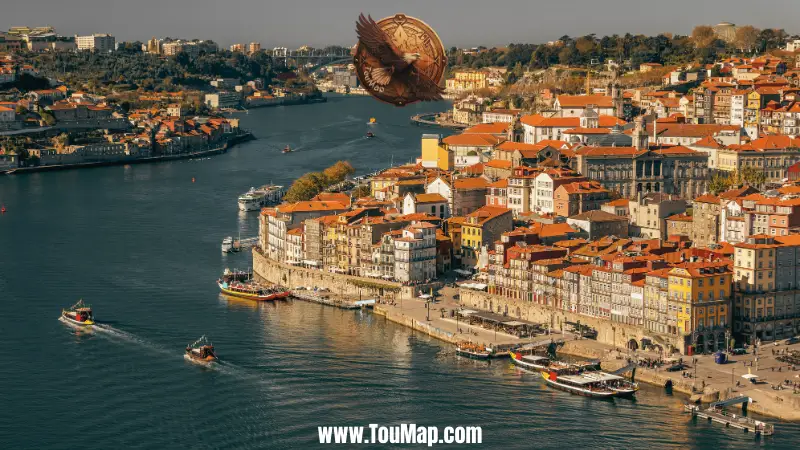
1. Overview:
Portugal, with its rich maritime history, sun-kissed beaches, and cosmopolitan cities, is a haven for travelers and digital nomads alike. This Western European gem beckons with its unique blend of ancient tradition and modern conveniences. Whether you’re strolling through the historical lanes of Lisbon, surfing the waves of the Algarve, or relishing the slower pace of Madeira, Portugal offers an enriching blend of experiences for the modern nomad.
2. Digital Nomad Communities:
Lisbon, Portugal’s vibrant capital, has been making waves in the digital nomad community. The city’s blend of historical charm, urban innovation, and a mild climate make it ideal for those seeking a balance between work and leisure. With numerous coworking spaces and a bustling startup scene, it’s no wonder that Lisbon has been dubbed the “Digital Nomad Capital of Europe.”
Madeira, an archipelago in the Atlantic Ocean and part of Portugal, has more recently been recognized as a digital nomad hotspot. With initiatives like the ‘Madeira Digital Nomad Village’ offering state-of-the-art working conditions amidst stunning natural beauty, it’s fast becoming a sought-after destination. Madeira’s proposition is unique – it provides a tranquil environment away from urban hustle, yet offers all modern amenities a remote worker craves.
Porto, to the north, while being an economic hub, retains a laid-back vibe that attracts many digital nomads. Its picturesque riverfront, the Douro Valley, and thriving arts scene make it a culturally rich location for remote work.
3. Connectivity and Workspaces:
Portugal is well-equipped for the digital age. Its cities boast high-speed internet and a plethora of coworking spaces. Lisbon’s LX Factory and NOW Beato are just a couple of examples of innovative spaces fostering creativity and connectivity. Madeira, despite its remote feel, surprises many with its top-tier internet infrastructure, making it easy for nomads to stay connected.
4. Leisure and Attractions:
Beyond work, Portugal is an adventure waiting to be explored. The Algarve’s pristine beaches are a haven for surfers, while Sintra’s mystical palaces transport you to another era. For those inclined towards gastronomy, Portugal’s culinary delights, from Pasteis de Nata to its famed Vinho Verde, are bound to tantalize the taste buds.
5. Cost of Living:
Portugal offers a high quality of life without the exorbitant costs associated with many Western European nations. This economic efficiency, combined with its cultural and geographical allure, makes it an ideal spot for digital nomads.
5.1. Accommodation:
- Lisbon’s city center apartments: $700 – $1,200/month.
- Madeira’s modern accommodations: $600 – $1,000/month.
- Hostels and shared accommodations across Portugal: $300 – $600/month.
5.2. Food:
- Eating Out: Portuguese cuisine, known for dishes like bacalhau and pastel de nata, is a treat. Dining out typically costs between $20 to $35 per day.
- Groceries: Monthly grocery bills hover around $150 to $300, depending on personal preferences.
5.3. Transportation:
- Monthly Pass: Public transportation, especially trams and buses, is efficient. A monthly pass averages about $40 – $50
- Taxi: Fairly affordable, with rates around $0.50 to $0.75 per kilometer.
5.4. Leisure and Entertainment:
- Cinema Ticket: Watching a film will set you back between $7 to $12.
- Local Tourist Attractions: Historical sites, like the Torre de Belém or Livraria Lello, might charge $5 to $20 for entry.
- Outdoor Activities: From surfing in Ericeira to hiking in the Azores, activities can range from $25 to $150.
5.5. Miscellaneous:
- SIM Card and Data Plan: Essential for connectivity, a monthly plan with ample data can cost between $20 to $40.
- Coworking Space Membership: Ranging from $100 to $300 a month, depending on the amenities and location.
5.6. Total Estimated Monthly Budget-Friendly:
Factoring in all the essentials, a digital nomad can expect to spend around $1,200 to $2,500 monthly in Portugal. Of course, individual lifestyles can influence this estimate.
Concluding, Portugal stands as a testament to the beauty of blending heritage with contemporary vibes. For digital nomads, it not only offers a conducive work environment but also an enriching life experience, filled with discoveries, friendships, and memories waiting to be made.
III. Indonesia

1. Overview:
Indonesia, an archipelago of over 17,000 islands, is a captivating blend of natural beauty, ancient cultures, and bustling modernity. Its vast stretches of pristine beaches, volcanic landscapes, and vibrant cities make it a haven for travelers and, more recently, digital nomads. From the verdant terraces of Bali to the dynamic streets of Jakarta, Indonesia promises a multifaceted experience for every visitor.
2. Digital Nomad Communities:
While Indonesia has countless attractions across its islands, Bali stands out as the crown jewel for the digital nomad community. Ubud, with its lush rice paddies and spiritual aura, and Canggu, with its surfer vibes and beachside cafes, have become meccas for remote workers. Beyond Bali, cities like Yogyakarta and Bandung are also gaining traction among those seeking a mix of work and cultural immersion.
3. Connectivity and Workspaces:
For a country so vast and diverse, Indonesia boasts commendable connectivity. Especially in tourist hotspots like Bali, you’ll find a plethora of coworking spaces catering to the global nomadic workforce. These spaces, set amidst tropical backdrops, offer not only high-speed internet but also opportunities to network and collaborate with like-minded individuals from across the globe.
4. Leisure and Attractions:
Beyond work, Indonesia is a treasure trove of experiences. Whether it’s diving into the crystal-clear waters of the Gili Islands, exploring the historic Borobudur Temple in Java, or trekking to witness the blue flames of Mount Ijen, Indonesia offers a delightful mix of adventure and serenity.
5. Cost of Living:
One of Indonesia’s greatest lures, besides its scenic beauty, is its affordability. This makes it a top choice for digital nomads seeking a tropical paradise that doesn’t burn a hole in the pocket.
5.1. Accommodation:
- Villas and Apartments: Especially in Bali, renting a villa with a private pool can cost between $500 to $1,000 a month. Modern apartments in city centers can be found in the range of $300 to $600.
- Shared Accommodation or Hostels: For those looking to socialize, shared spaces can be found for $150 to $350 a month.
5.2. Food:
- Eating Out: Indonesian cuisine, with dishes like Nasi Goreng and Satay, is a mouthwatering experience. Dining out might cost between $10 to $20 per day.
- Groceries: Preparing meals at home? Monthly groceries might range between $100 to $200.
5.3. Transportation:
- Motorbike Rentals: The most popular way to get around, especially in Bali, is by motorbike, costing around $50 to $70 a month.
- Taxi or Ride-Sharing: Apps like Gojek and Grab are prevalent, with rides averaging $2 to $10, depending on the distance.
5.4. Leisure and Entertainment:
- Cinema Ticket: Watching a film will cost between $3 to $7.
- Local Tourist Attractions: Entry to attractions like the Sacred Monkey Forest or Tegallalang Rice Terrace might cost $3 to $15.
- Outdoor Activities: From scuba diving to volcano trekking, activities can range from $25 to $100.
5.5. Miscellaneous:
- SIM Card and Data Plan: A SIM with a generous data package can be availed for $10 to $30 a month.
- Coworking Space Membership: Depending on the amenities and location, memberships range from $50 to $200 a month.
5.6. Total Estimated Monthly Budget-Friendly:
Considering all essentials, a digital nomad can anticipate spending approximately $800 to $1,500 monthly in Indonesia. This estimate, of course, can vary based on individual preferences and lifestyle choices.
Indonesia, with its vibrant tapestry of experiences, beckons digital nomads seeking more than just a change of workspace. It’s a country that invites you to dive deep—both into its azure waters and its rich cultural mosaic. For those ready to embrace the island life, while staying connected to their global ventures, Indonesia is nothing short of paradise.
IV. Conclusion
As the sun sets over the terracotta rooftops of Marrakech, the rhythmic waves of Indonesian beaches, and the vintage charm of Portuguese streets, one thing becomes abundantly clear: the world brims with endless opportunities for digital nomads.
Each destination, with its unique allure, promises a symphony of experiences, from culinary delights to soul-stirring landscapes, all while being kind to your budget. The beauty of our interconnected era lies in its promise of freedom, balance, and exploration.
Whether you’re seeking a new backdrop for your Zoom calls or a fresh cultural immersion, remember that the world is vast, inviting, and more accessible than ever. Cherish the journey, for each click on your keyboard can now resonate with memories from a faraway land. Safe travels and happy working!
V. Frequently Asked Questions (FAQ)

1. Why is Madeira mentioned as a special hub for digital nomads in Portugal?
Madeira, specifically with its ‘Digital Nomad Village’ initiative in Ponta do Sol, provides a unique blend of natural beauty and state-of-the-art amenities tailored for digital nomads. It’s not just about the infrastructure; the community-driven activities and the serene environment make Madeira a standout destination for remote work.
2. Is English widely spoken in these countries?
In tourist and digital nomad hubs across Morocco, Portugal, and Indonesia, English is commonly spoken, especially by younger generations and in business settings. However, picking up a few local phrases can enhance your experience and is often appreciated by locals.
3. Are these countries safe for solo travelers or digital nomads?
Yes, Morocco, Portugal, and Indonesia are generally safe for solo travelers and digital nomads. Like any destination, it’s essential to be aware of your surroundings, respect local customs, and take basic safety precautions, especially during night-time.
4. How reliable is the internet connection for remote work in these destinations?
Urban areas in all three countries generally offer reliable high-speed internet suitable for remote work. Madeira’s Digital Nomad Village and coworking spaces in Marrakech or Bali, for instance, are designed keeping digital professionals in mind. Nonetheless, it’s always a good idea to have a backup option, like a local SIM card with a data plan, especially if traveling to more remote areas.
5. What’s the best time of year to visit these countries as a digital nomad?
While these destinations can be visited year-round, the ideal time varies. For Morocco, the months from October to April are preferred due to milder temperatures. Portugal, especially coastal regions like the Algarve, is popular in spring and fall. Indonesia, with its tropical climate, is best visited during its dry season from May to September.
6. Can I easily find short-term accommodations suited for digital nomads in these countries?
Absolutely! With the rise of digital nomadism, there has been a corresponding increase in accommodations catering to short-term stays. Websites like Airbnb, as well as local platforms and dedicated co-living spaces, offer myriad options tailored to the needs of remote workers.
7. Are there any specific visa programs for digital nomads in these countries?
Each country has its visa regulations. While Portugal has been discussing a potential digital nomad visa, it’s always best to check the latest visa requirements and programs directly from official consulate or embassy websites or consult with expat communities.
8. Can I get by just using digital payment methods, or is cash recommended?
While credit/debit cards and digital payments are gaining traction, especially in urban areas, it’s advisable to carry some cash, particularly in more rural locations or small establishments in all three countries.
Remember, while FAQs offer a foundation of general information, nothing beats firsthand accounts. Engaging with digital nomads currently residing in these destinations can yield tailored insights specific to individual needs. Additionally, consider joining our TouMap Community to benefit from collective experiences. Don’t forget to check out our resource reviews platform too; it’s curated with choices that are not only apt but also come at proven competitive prices.
